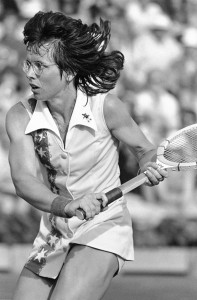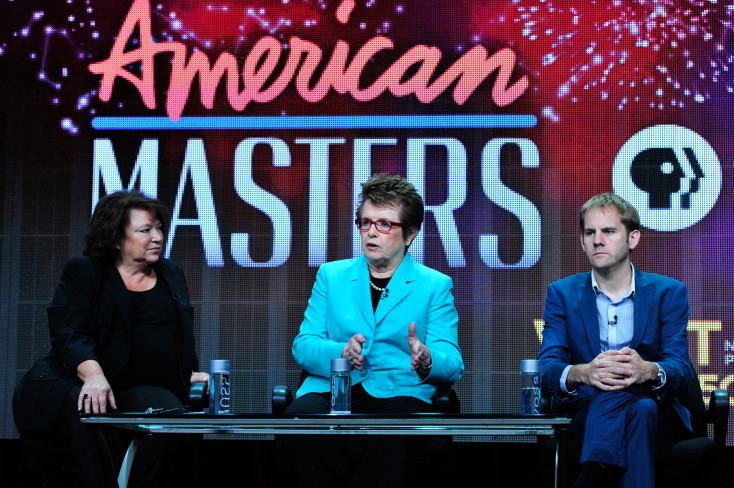
Billie Jean King, Tennis, former Wimbledon winner downed Kerry Reid 6-3, 7-5 after a sudden death tiebreaker in the 2nd set during the Semi-finals singles match in the Family Circle Magazine Cup tournament at Hilton Head Island’s Sea Pines resort on April 2, 1977. King is attempting a comeback after knee surgery. ©AP. CR: Kathy Willens.
By JUDY SLOANE
Front Row Features
HOLLYWOOD—It’s hard to sum up what Billie Jean King attained in her career as one of the great tennis players of all time, and in her private life fighting for social change and equality. But PBS’ “American Masters” is up to the task, spotlighting King’s achievements on Sept. 10, to commemorate the 40th anniversary of the King v. Riggs “The Battle of the Sexes” match, and the founding of the Women’s Sports Foundation.
King, 69, won a record 20 Wimbledon titles, 39 Grand Slam singles, doubles and mixed doubles during her illustrious career. But I did feel during her appearance at the TV Critics tour last month, that what she accomplished off the court means as much to her.
Q: All the time you were winning on the tennis court, you were also fighting for women’s rights. What do you remember about that period?
King: When people say, “What do you remember about the ’70s?” I go, “I was tired.” That’s all I remember. I was exhausted every moment. But God gave me extra energy, so I’m very fortunate.
Q: Why do you feel it’s still so hard to get equality between men and women when it comes to pay?
King: Sports is a microcosm of society, and all it does is reflect the reality of what it is for women. It’s just difficult. Everything takes time. We’re still getting 77 cents on the dollar. Thank God for Title IX, in 1972, or we’d be much worse off.
Q: What really surprised me watching the documentary was you held a news conference to say that you had had an affair, which hadn’t been done before.
King: Marilyn Barnett is the one who claimed that we had an affair, and we did, but she claims other things that were out to lunch, but it doesn’t matter. The essence was I was outed. My lawyer, Dennis Wasser, and my publicist, Pat Kingsley, thought I shouldn’t do it, and I said, “I have to.” I argued with them for 48 straight hours. I was exhausted. I said, “I have to tell the truth,” and they said, “It’s never been done.” And I said, “I don’t really care. You don’t understand. It’s about being truthful to my audience and to my fans and to the world.” At that time, I was still trying to find myself. I had asked (then husband) Larry (King) for a divorce, and he didn’t want one. It was very difficult, and my poor parents are homophobic. I grew up homophobic, so you can imagine this challenge. I didn’t get comfortable in my own skin—until I was 51—about being gay.
Q: When you’re looking back on your career, are you sorry that you did the Bobby Riggs match, because it has taken on almost too much prominence, when it was just a fun thing at the time?
King: No, it was not fun. Maybe for you watching, but (it was) not (fun) for Bobby or me playing. I definitely didn’t want to play Bobby. When he played Margaret (Court) and she lost badly, I had to play him because I was worried about Title IX. I was worried about our (women’s) tour. I was worried about perception, and I didn’t have a choice. I knew what (the match) stood for. It was very symbolic of the women’s movement and what we were trying to do. Title IX had just passed the year before (on) June 23, 1972. I wanted to start to change the hearts and minds of people, and I knew there were a lot of people who wanted to weaken that piece of legislation, and I was scared. Back in 1973, a woman could not even get a credit card without her husband’s co-signing. It was about equality.
Q: What did you think of Bobby Riggs?
King: He was a chauvinist. But as a child I read every book I could on tennis, and I adored Bobby Riggs because he was a former No. 1 player in the world. He won the Triple Crown at Wimbledon. I had total respect for him. And the reason I beat him is because I respected him. I knew I had to win. I don’t know how to explain it. It was a turning point. It was the moment of truth. I knew there was going to be more focus on this moment than I was ever going to have the rest of my life, and it mattered what I did. I just had to win this match.
Q: What was your relationship like with him after that match?
King: Great friends up to the very last moment. I used to tell him this match was about history and change, and he used to say, “Honey, it’s about money and hustling.” And I’d go, “No, Bobby, you don’t understand.” The night before he passed away, we were on the phone, and I said, “Bobby, I really care about you. How are you doing?” He said, “I’m not good. I guess we really did make a difference, didn’t we?” And I thought, “Thanks to God.”
Q: Is there anyone playing today that you look at and think, “If I were in my prime, I would love to play against them?”
King: Are you kidding? You know how I’d get a game today? If they double-faulted. (She laughs.) Every generation gets so much better. I would want to play them if I was born today, but I’d probably have to be six inches taller. (Maria) Sharapova is six-foot-two-and-a-half-inches (tall); Venus (Williams) also is six-foot-two-and-a-half inches; Serena (Williams) is short at five-foot-eleven-inches. It’s unbelievable. They’re giants.





